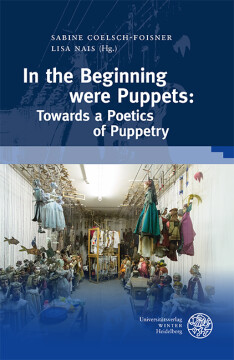
BUCH
In the Beginning were Puppets: Towards a Poetics of Puppetry
Herausgeber: Coelsch-Foisner, Sabine | Nais, Lisa
Wissenschaft und Kunst, Bd. 39
2023
Zusätzliche Informationen
Bibliografische Daten
Abstract
The study privileges the puppet as a new and revealing point of access to contemporary critical debates regarding performance, genre, affect, aesthetics, cultural production, political activism and the nonhuman studies. The contributors address a striking range of performance histories, aesthetic movements and theoretical positions, from the Arabic influence on Iberian shadow puppetry to the position of the puppet in post-Revolutionary Iran and the American anti-war movement; from the puppet’s central role in the development of European theatre to avant-garde and modernist anti-theatre; from the puppet’s place in the histories of visual art and experimental film to critiques of mass media. By paying careful attention to the specific roles and varieties of puppets in these diverse historical, political and cultural contexts, the collection provides new insights into the practices, aesthetics and ethics of puppet theatre, which serve, in turn, to interrogate anew the relationships between the human and the nonhuman, the material and the immaterial, the uncanny and the sublime.
Inhaltsverzeichnis
| Zwischenüberschrift | Seite | Aktion | Preis |
|---|---|---|---|
| Cover | Cover | ||
| Titel | iii | ||
| Imprint | iv | ||
| Contents | v | ||
| Foreword | vii | ||
| SABINE COELSCH-FOISNER: Why Puppets Matter: Ten Concepts to Approach Puppets on Stage and Beyond, with a Focus on the Salzburg Marionette Theatre Productions ‚Pùnkitititi!‘ (2020) and ‚Bastien and Bastienne‘ (2006/07, revived 2019) | 1 | ||
| ESTHER FERNÁNDEZ: Rebellious Silhouettes: From Arabic Shadows to Optical Illusions in Iberia | 27 | ||
| FRANCESCA CECCONI: The Legacy of Commedia dell'arte in Nino Pozzo's Puppetry | 41 | ||
| ERWIN POKORNY: The Magician as a Puppeteer | 57 | ||
| EMILY LEQUESNE: A Hall of Mirrors: Why Use a Puppet? | 75 | ||
| WOLFGANG BÜCHEL: Zum literarischen Kleinphänomen der Apostrophierung von Dramen als Puppenspiel: Pareidolie, Gesichtsmetapher und anthropomorphe Gestalt | 91 | ||
| CATERINA PAN: Kasperl's Genesis: Intercultural Heritage of the Popular Matrix | 105 | ||
| ALISA RAKUL: Maeterlinck's Plays for Marionettes: Making Voice and Silence Sound Simultaneously | 121 | ||
| DAVID KRYCH: “Die zehnte Muse": Jan Sztaudyngers ‚Marionetki‘ (1938) | 139 | ||
| SARAH PLUMMER: The Puppet 'Other': Bread and Puppet Theater's Depiction of Racialised Peoplein Anti-War Circuses | 159 | ||
| SAHEREH ASTANEH: The Transformation of the Puppet Theatre in Iran after the Revolution of 1979 | 173 | ||
| GEORGIA CHRYSSOULI: Jan Švankmajer: The Uncanny Life of a Puppet | 179 | ||
| PIERO CORBELLA: Carlo Colla & Figli: A Marionette Company Blending Tradition and Innovation | 203 | ||
| ANTONIA NAPP, SILKE TECHNAU, ANNIKA SCHULTE: Scenic Spaces in Museum Spaces – A Work-in-Progress-Report from the Museum of Theatre Puppets in Lübeck | 217 | ||
| List of Contributors | 235 | ||
| Backcover | Backcover |


 Publishing Platform by CloudPublish
Publishing Platform by CloudPublish